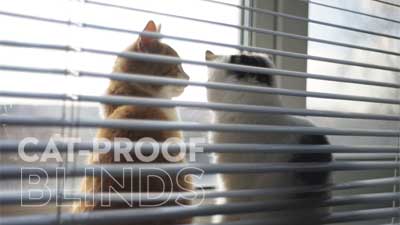Natural Ways to Protect Your Cat: 9 Effective Flea Repellents

Photo by Vannie on wikimedia
Fleas, those pesky parasites, can be a distressing presence for both cats and their owners. The incessant scratching, visible dirt-like specks in the fur, or even bites on the human inhabitants signify an unwelcome flea infestation. However, resorting to strong chemicals isn't the sole solution. Numerous natural remedies exist to effectively deter these bothersome pests and keep your feline friend comfortable and flea-free.
Recognizing the Signs of Flea Infestation
Fleas are notorious for their ability to make their presence known through various signs:
Scratching: Excessive scratching and itching are common indicators that your cat may be grappling with fleas.
Visible Specks: Flea dirt, often mistaken for dirt or small particles, is actually flea excrement, evident in your cat's coat or bedding.
Bites and Irritation: If you find yourself or family members with unexplained bites, it could be a result of fleas thriving in your home environment.
While dealing with fleas is an unpleasant aspect of pet ownership, natural remedies offer effective solutions without resorting to harsh chemicals that may have potential side effects on your furry companion.
1. Cedar Chips: Harnessing Natural Aroma
Fleas have an aversion to the distinctive scent of cedar chips, making them a natural deterrent. Sprinkling cedar chips around your cat's bedding or in outdoor areas serves as a preventive measure against flea infestation. However, caution is advised against using cedar essential oil, which could pose harm if ingested by your cat.
2. Lemons: Citrus Power Against Fleas
Lemon juice, rich in citric acid, stands as a powerful flea killer. By boiling cut lemons and creating a solution, you can effectively tackle fleas. Spraying the cooled lemon-infused liquid on your cat's bedding aids in eradicating fleas from their immediate environment. Yet, direct application of lemon to your cat's fur is discouraged due to potential irritation or ingestion concerns.
3. Rosemary and Cumin: Kitchen Allies
The distinct scent of rosemary serves as a deterrent for fleas. Grounding dried rosemary leaves and strategically sprinkling the powder in areas frequented by your cat, such as its bedding or favorite spots, effectively deters fleas. For additional protection, a rosemary-infused spray, applied sparingly to your pet's coat after proper preparation, can further discourage fleas.
Cumin, another kitchen staple, can be introduced into your cat's diet in minimal quantities. Its odor renders the cat's skin unappealing to fleas. However, cautious administration is crucial to prevent any adverse effects on your pet's health.
4. Apple Cider Vinegar: Flea-Jumping Assistance
While not directly lethal to fleas, apple cider vinegar prompts these pests to jump off your cat, facilitating easier removal. A mixture of apple cider vinegar and water, sprayed onto your cat's coat, aids in deterring fleas. Multiple applications might be necessary for complete eradication of these pests.
5. Dish Soap: Exoskeleton Breakdown
Mild dish soap emerges as an unexpected yet effective flea exterminator. Wetting your cat's coat and gently lathering the soap, focusing on flea-prone areas, effectively breaks down their exoskeletons. However, caution is advised against frequent use due to the potential drying effect it might have on your cat's skin.
6. Lavender and Chamomile: Soothing Flea Fighters
The calming properties of lavender make it an excellent natural flea killer. Preparing a lavender-infused solution and applying it to your cat's coat offers an effective yet gentle approach to combating fleas.
Similarly, loose chamomile tea, when steeped and cooled, provides another natural remedy against fleas. Both treatments can be safely repeated daily, offering relief from flea irritation.
7. Coconut Oil: Flea-Smothering Remedy
Rich in healthy fats, coconut oil not only soothes itchy skin but also effectively smothers fleas. Following a thorough bath with flea-specific shampoo, applying coconut oil to your cat's damp fur offers a natural and comforting solution. After allowing the oil to work its magic for a couple of hours, a thorough rinse ensures the removal of both oil and smothered fleas.
8. Flea Comb: Physical Removal Technique
A flea comb, featuring closely spaced teeth, proves to be an effective tool for physically removing fleas from your cat's coat. The comb, when run through your cat's fur, traps fleas, which can then be submerged in soapy water for their demise. This process not only relieves your pet from flea bites but also assists in managing loose fur.
9. Oregano Oil: Flea-Repelling Solution
Oregano oil, rich in a compound called carvacrol, exhibits potent flea-repelling properties. A carefully prepared solution, mixing oregano oil with olive oil and sparingly applying it to flea-prone areas on your cat's body, serves as an effective yet gentle approach against fleas.
FAQs About Fleas on Cats
Identifying Fleas: Fleas appear as small, black or brown bugs or tiny black specks in the fur, often known as "flea dirt."
Flea Hiding Spots: Fleas tend to hide in warm, protected areas such as the groin, ears, neck folds, or armpits.
Flea Size and Detection: Fleas are less than 1/8-inch long and might be challenging to spot, especially on dark-furred cats. Utilizing a strong flashlight aids in their identification.
Checking for Fleas: Parting the fur with fingers or using a flea comb assists in locating fleas or signs of flea excrement.
In conclusion, natural flea repellents offer a safe and effective means of combatting these pests without resorting to harsh chemicals. With a range of remedies available, cat owners can address flea infestations while prioritizing the well-being of their beloved feline companions.
You May Also Like
 Cat-Proof Blinds8 Best Cat-Proof Blinds: Durable, Easy to Install, and Long-Lasting
Cat-Proof Blinds8 Best Cat-Proof Blinds: Durable, Easy to Install, and Long-Lasting Cat NamesBrown Cat Names: 50+ Ideas for Warm-Colored Cats
Cat NamesBrown Cat Names: 50+ Ideas for Warm-Colored Cats Cat vs. Dog IQCat IQ vs. Dog IQ: Who's Smarter?
Cat vs. Dog IQCat IQ vs. Dog IQ: Who's Smarter? Cat HealthHow Much Thiamine Does A Cat Need Per Day?
Cat HealthHow Much Thiamine Does A Cat Need Per Day? Tiny Cat Breeds12 Tiny Cat Breeds That Don't Weigh More Than 11 Pounds
Tiny Cat Breeds12 Tiny Cat Breeds That Don't Weigh More Than 11 Pounds Black and White CatsThe 10 Cutest "Black & White" Cat Breeds
Black and White CatsThe 10 Cutest "Black & White" Cat Breeds